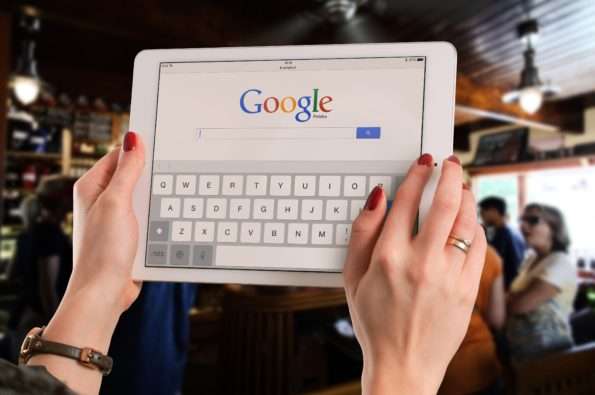Lord of the Flies is literally the worst book ever. It’s hard to understand and once you are able to comprehend it, the story appears to just be about a group of boys who go kind of crazy when their plane crashes on an island. They are left without adults and rules. My English teacher had other ideas about the book though. She explained that it demonstrated the innate corruption that is found in everyone… or something like that. Confusing, right?
So, when she asked me to write a paper analyzing a character in the book, the first thing I did was take out my phone and google: “Lord of the Flies: Jack.” Pages upon pages of results came up so I simply just picked the first link, which happened to be Cliff Notes, and read a page about how Jack represented the “innate savagery and thirst for power that some people succumb to when the rules of civilization are not enforced.”
I then based my entire paper on that page of Cliff Notes, and guess what? I got an A. While technology can be great way to learn, personal technology, such as cell phones, that can act as academic crutch is making today’s students significantly less intelligent than our parents generations.
Social Media and Distractions
After every single Spanish test, we are allowed to use our phones, read, or work on other homework. If you were to look around the room you would see almost every single student on their phone. Whether we are snapping, texting, playing games, or doing puzzles, we are on our phones. While some of us have homework to do, we ignore that responsibility and turn to social media instead.
According to a survey* conducted in Elk River High School, 98.3% of high school students bring their phones to class every day. The problem with this is that students are using their phones during class to check social media rather than paying attention to their teachers or working on their notes and assignments. Today’s generation of students are tweeting, snapping, and liking, but they are not learning, leading to an decline in academic proficiency. While you can learn a lot from a phone, since it is literally a tiny computer with answers to everything, are students using their phones educational purposes?
According to a survey conducted in Elk River High School, over 50% students don’t use their phones for anything that could be considered educational. Out of the students that do use their phones for education, most only do so on school grounds. An extreme majority of students use their phones only for games and social media.
Out of 288 high school students sampled, 5 out of every 11 even admitted to using social media during class.

So, what does this mean? Social media and cell phones are distracting students from learning and are doing nothing to help students to learn, thus explaining a decline in students’ test scores in the last few years: “The average 12th-grade mathematics score in 2015 […] was lower than the score in 2013 […]” According to the same source, within three years, the percent of high school seniors that were at a “below basic” level for math increased by 3%.
Now, you might be asking yourself, why? Well, Gordon Pennycook a co-author of a study featured on wellmind.com, a website that complies with the HONcode standard, states, “Our research provides support for an association between heavy smartphone use and a decrease intelligence.” Since phones are becoming more and more common in schools, it makes sense that math scores would be dropping.
Mental Strength and Brain
However, social media and distractions are not the biggest factor leading to a decline in academic proficiency in today’s generation’s of students. Overall usage of cell phones is affecting students’ brains. According to the US National Library of Medicine and the National Institutes of Health, when a person’s brain is exposed to the radiation expelled from a cell phone for 28 days, their brain can be significantly impaired in terms of spatial memory and a thinning blood brain barrier.
Constant exposure to the radiation, the study found, could make the blood-brain barrier more permeable, leading to increased brain damage. This brain damage leads to memory loss and hinders the brain’s ability to process and absorb information.

Phones can also impair our sleep patterns and you know it. How many times have you stayed up way to late because Netflix automatically plays the next episode? Because you lost track of time scrolling through instagram? Because your friend kept snapchatting you? Because for me, it’s a daily struggle. I stay up too late, then I can’t concentrate in second hour. Then I fall asleep in fourth hour, go home after school, take a nap and don’t do my homework. Phones can affect students sleep patterns to the point where they cannot concentrate on school work or learn because they are tired.
Cell phones can also ‘overload’ our brains with a “barrage of notifications, emails, texts and squillions of click-bait links,” according to a study by Dr Rosen. While it is amazing that so much information is at our fingertips, when our brains are overwhelmed by “scattergun thoughts” we can become “very tired and miserable,” states Dr Rosen.
As Rosen calls them, “scattergun thoughts” would explain people’s shortening attention spans. Studies featured by a branch of the Hearst UK Wellbeing Network show the average Millenial concentrates on one thing for less than five minutes before being tempted to switch to something else. This study provides another reason cell phones are leading to a decrease in academic proficiency.
If one can’t focus on learning, they can’t learn.
Objections
Many people object, and argue that cell phones actually make us smarter. According to the Nashville Business Journal, because technology is completely customizable now, there are a “host of alternatives that you might like better than the native apps that will keep you organized” and send information to you in different ways. Their point being: since we can customize technology and the way it sends us information, we can customize it to our learning style so we can absorb information in the most efficient way possible.
While the NBJ has a point, whether or not cell phones make us smarter all comes down to the people using the cell phones. If we wanted to learn from our phones, we could very easily set up our phones to send us information efficiently. However, as mentioned earlier, majority of students do not use their phones for educational purposes, rather for games and social media. If we wanted to learn from our phones we could. But we choose not to.
The Nashville Business Journal and Intelligence for Your Life also argued that smartphones improve our memory: [perfectpullquote align=”right” bordertop=”false” cite=”” link=”” color=”” class=”” size=””]“ The art of remembering is the art of thinking”[/perfectpullquote]
“According to my favorite science source, Bill Nye the Science Guy, smartphones can actually
make you smarter, because they help free up memory you’d normally use for mundane information, so you can use it for something else.” However Columbia University argues something much different: welcome to the world of the Google Effect.
The Google Effect
An incredible 81% of us have our smartphones within arm’s reach nearly all the time, and one in five young people admit to checking their screens every five minutes. Many people are finding it harder and harder to do simple tasks, like finding their way to a restaurant, or using logical reasoning to answer questions without first consulting their smartphone.
In a survey conducted in Elk River High School, 83% of students said they use google every day, with 28.8% of those surveyed admitting that they use google 6 or more times a day.

This is called the “Google Effect”, a condition identified by researchers at Columbia University: “It has become so commonplace to look up the answer to any question, it can feel like going through withdrawal when we can’t find out something immediately,” found researcher Betsy Sparrow. The study concludes: “We are becoming symbiotic with our computer tools, growing into interconnected systems that remember less by knowing information than by knowing where the information can be found.”
So, to put that into normal people English: Because the answer to everything is on the internet, “our own internal hard drives have become fuzzy-headed.” Basically, since google has everything we could ever need information wise, our brains neglect to store basic or trivial facts. Because of the Google Effect, we don’t have accurate spatial memories or sense of directions either.
If you don’t believe me, let me tell you a story. Once upon a time, my friends and I had to walk from Meadowvale Elementary to Caribou, both in Elk River, Minnesota. They are about two miles apart. My phone was dead. My friends didn’t have service. We thought we knew how to get there, considering all three of us have lived in Elk River the majority of our lives. Key word here: we thought.
We wondered around for thirty minutes and passed the same tree three times. Once one of my friends got service, we went to google maps and plugged in Caribou. Turns out, we had to follow the sidewalk, cross a road, take a left, and we would be there. And to reiterate, all of us have lived in Elk River for more than nine years, and Meadowvale and Caribou are two miles apart.
In the Wall Street Journal, Nicholas Carr wrote an article about the importance of knowing and remembering trivial facts rather than offloading them off of our internal hard drives onto our phones. He wrote, “Only by encoding information in our biological memory can we weave the rich intellectual associations that form the essence of personal knowledge and give rise to critical and conceptual thinking. No matter how much information swirls around us, the less well-stocked our memory, the less we have to think with.” His ideas stemmed from the psychologist and philosopher William James, who said in his 1892 lecture, “the art of remembering is the art of thinking.”
The Google Effect affects our ability to critically and conceptually think because we don’t have information think with, since everything is in our phones, rather than our heads.
Carr’s argument helps to explain my struggle with the Lord of the Flies paper last year in English. Because I don’t have dumb trivial facts swirling around in my head, I struggled to think both critically and conceptually about the plot and character development of the book. So, I did what all other students do. I turned to Google for the answers, worsening the Google Effect, my ability to think on my own, and my dependance on the internet.
Conclusion
In conclusion, cell phones are leading to an academic decline in today’s students because of social media, distractions that a phone can provide, cell phones’ effects on the human brain, and the Google Effect. So, next time your English teacher assigns a paper based off of a boring, confusing, “classic,” book such as Lord of the Flies or The Great Gatsby, don’t reach for your phone, don’t say “Hey Siri,” and don’t go to Google.
Use your brain, you can do it.
*All surveys conducted in Elk River High School mentioned in this post were conducted by me
Featured Image from Pixabay.com
